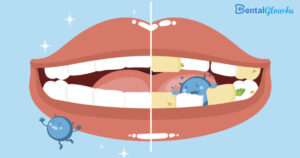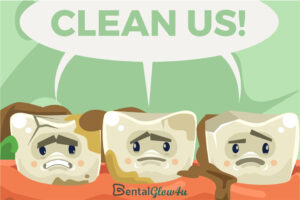The Alarming Consequences of Not Brushing Teeth: What You Need to Know
The Breath of Doom
First on our list is the infamous bad breath, halitosis. Imagine walking into a room and instantly clearing it out like a skunk at a picnic. When you don’t brush, food particles and bacteria team up to create a potent odor that can clear crowds faster than a fire alarm. The sulfur compounds produced by these bacteria are not just unpleasant; they can signal deeper issues like gum disease, which is essentially your mouth’s way of waving a red flag saying, “Help! I’m in distress!”

Cavity Catastrophes
Next up is the dreaded tooth decay. When plaque—a sticky film of bacteria—builds up on your teeth, it produces acids that start munching away at your enamel like a kid at an all-you-can-eat candy buffet. If left unchecked, this can lead to cavities, which are holes in your teeth that scream for a dentist’s drill. And let’s be honest, nobody wants to be on a first-name basis with their dentist because they can’t spare two minutes for brushing twice a day.
Gum Disease: The Silent Saboteur
Now, let’s talk about gum disease, which starts innocently enough with gingivitis—red, swollen gums that bleed when you brush. If you ignore this warning sign, it can progress to periodontal disease, where bacteria invade deeper tissues and even cause bone loss. This isn’t just an oral issue; studies suggest that gum disease is linked to serious health problems like heart disease and diabetes. Yes, you read that right—your mouth could be plotting against your heart!
The Bacterial Bonanza

Did you know your mouth is home to over 700 different strains of bacteria? While most are harmless party guests, some are troublemakers like Streptococcus mutans, which love sugar and create tooth-eroding acids. If you don’t brush regularly, these bacteria multiply like rabbits on a sugar high, leading to not just bad breath and cavities but potentially serious health issues including pneumonia and even dementia! That’s right; neglecting your oral hygiene could make you forget where you left your keys—or worse.
The Ripple Effect on Overall Health
The consequences of poor dental hygiene extend beyond just your mouth. Research has shown that individuals with gum disease are at a higher risk for coronary artery disease due to inflammation caused by bacteria entering the bloodstream.
A Call to Action: Brush Like Your Health Depends on It
So how do we combat these hidden dangers? The answer is simple: brush your teeth twice a day for at least two minutes each time! Use fluoride toothpaste to strengthen enamel and don’t forget to floss—because those pesky bits of food hiding between your teeth won’t remove themselves! Regular dental check-ups are also crucial; think of them as routine maintenance for your mouth’s engine.
